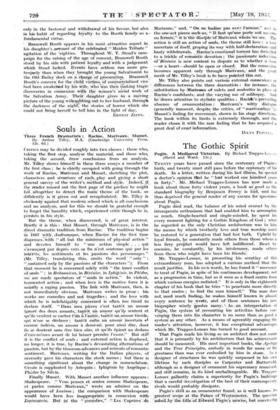Souls in Action
Three French Dramatists : Racine, Marivaux, Musset. By Arthur TilleY, M.A. (Cambridge University Press. 12s. 6d.) 12s. 6d.)
CRITICS may be divided roughly into two classes : those who, taking the "first step, analyse the material, and those who; taking the ,second; draw conclusions from an analysis. Mr. Tilley shows himself in these three essays a member of the first class ;* he is chiefly occupied with going through the work of Racine, Marivaux 'and MUsset, sketching the plot, characters and structure. of each play. and giving a short- general survey of the writer's. Method and-Style. 'Indeed, if the reader missed out the first page of the preface he might fail. altogether to detect the main' theme of the book, so diffidently is it given out and recapitulated. Mr. Tilley is obviously against that modern school which is all conclusions and no analysis, and for this we should be grateful enough to forget the banality which, experienced critic though he is, persists in his style.
But the theme, when discovered, is of great interest. Briefly it is this : that Musset, through Marivaux, is in the direct dramatic tradition from Racine. The tradition begins in 1667 with: Androm,aque, when- Racine for the 'first time dispenses -with ,-!` all. but the minimum, of physical action " and devotes himself to " une action simple . . . qui s'avaneant par degres vers sa fin n'est _soutenue quo par. les interets, les sentiments et les passions des personnages " (Mr. Tilley, translating this, omits the word " only " " sustained only by the passions of the characters "). From that moment he is concerned solely with " the inner conflict of souls " ; in Britannicus, in Berenice, in 1phiginie, in Plzedre, we are made spectators of " souls in action." In violent, tormented action ; and when love is the motive force it is usually a- raging passion. The -link with Marivaux, then, is not immediately obvious. Marivaux writes in prose ; his works are comedies and not tragedies ; and the love with which he is indefatigably concerned is often too timid to declare itself. " Dans "mes pieces c'est tantet un amour ignore des deux amants,. tantOt uh amour qu'ils sentent et qu'ils veulent se eacherrtrn l'autre, tantet un amour timide, qui n'ose se declarer ; tantet enfin un amour incertain et comme indecis, un amour a demi-ne, pour ainsi dire, dont its se doutent sans etre bien sirs, et qu'ils epient au dedans d'eux-memes avant de lui laisser prendre l'essor." But still it is- the conflict of souls ; and external action is displaced, no longer, it is true, by Racine's devastating alternations of passion, but by the timorous advances and retreats of romantic sentiment. Marivaux, writing for the Italian players, of necessity gave his characters the stock names ; but there is something significant about the. change in nomenclature. Oreste is supplanted by Arlequin : Iphigenie by Angelique : Phdre by Silvia.
Finally Musset. With Musset another influence appears : Shakespeare. ." Vous pensez et sentez comme Shakespeare, et parlez comme Marivaux," wrote an admirer on the appearance of Louison ; the comparison with Shakespeare would have been less inappropriate - in .connexion with Lbrerizaecio: But
Marianne," and, " On ne badine pas ave.; l'amour," and in the one-act pieces- such es; " Il cant qu'une porte snit ouverte
ou reriti66," ctsciplelif Marivaux WhoinIve-See. The action is still an action of souls, the theme still love : a love uncertain of itself, groping its way with half-declarations and hasty withdrawals.. Racine's-emotional torrent has dwindled
to a trickle of romantic devotion ; the passionate indecision
of 'Bevil:ice is now content to dispute as to whether a door
—or a heart—should be open or closed. But the connexion becomes apparent only through Marivaux,' and the great _ merit of Mr. Tilley's book is to have painted this out.
Mr. Tilley also points out various external- connexions or differences between the three dramatists : for instance, the substitution by ,Marivaux of valets and soubrettes in place of . Racine's confidants, and the varying use of soliloquy. And he draws attention to stylistic- qualities : Racide's:prevailing absence of ornamentation : Marivaux's witty dialogue (generally innocent, despite the critics, of " marivaudage"): Musset's feeling for movement, shown in his stage directions. The book within its limits is extremely thorough, and the reader closes it with the rare feeling that he has acquired a great deal of exact information.
Po
DILYS














































 Previous page
Previous page